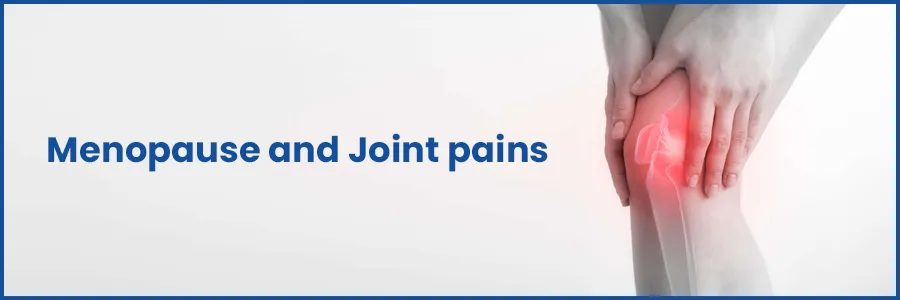- Cardiology 84
- Dermatology 45
- Endocrinology 33
- ENT 16
- Fertility 190
- Gastroenterology 78
- General-Medicine 81
- Gynecology 80
- Hematology 19
- Infectious-Diseases 33
- Neurology 52
- Oncology 34
- Ophthalmology 23
- Orthopedics 69
- Pediatrics 31
- Procedure 23
- Public-Health 144
- Pulmonology 59
- Radiology 8
- Urology 68
- Wellness 161
- Woman-and-child 77

Menopause and Joint Pains: All You Need to Know
Menopause is a natural phase in every woman's life that signifies the end of her reproductive years. While it can be a liberating transition, menopause also brings about various physical and hormonal changes.
One common challenge women face during this time is joint pain. We will explore the connection between menopause and joint pains, shed light on the causes, and offer effective strategies for managing and easing discomfort during this transformative phase.
What is Menopause
Menopause is a normal biological process that occurs in women between the ages of 45 and 55. It is officially defined as the absence of menstrual periods for 12 consecutive months.
During menopause, the production of estrogen and progesterone, two essential hormones for female reproductive health, decreases significantly.
Connection Between Joint Pains & Menopause
As women approach and experience menopause, hormonal fluctuations can impact various systems in the body, including the musculoskeletal system. Estrogen plays a crucial role in maintaining joint health, as it helps reduce inflammation and contributes to joint lubrication.
Therefore, the decline in estrogen levels during menopause can lead to joint-related issues, such as stiffness, swelling, and pain.
Common Joint Pains During Menopause
- Osteoarthritis: Menopause can exacerbate osteoarthritis, a degenerative joint disease that causes the breakdown of cartilage and leads to joint pain and stiffness.
- Rheumatoid Arthritis: Some women may experience the onset of rheumatoid arthritis during menopause, an autoimmune disorder that causes joint inflammation and pain.
- Carpal Tunnel Syndrome: Menopause-related hormonal changes may contribute to swelling in the wrists, leading to compression of the median nerve and causing carpal tunnel syndrome.
- General Joint Discomfort: Many women report generalized joint discomfort during menopause, which may affect various joints in the body.
Tips to Manage Joint Pains During Menopause
- Stay Active: Engage in regular low-impact exercises, such as walking, swimming, or yoga, to keep joints flexible and strengthen surrounding muscles.
- Maintain a Healthy Weight: Excess weight puts additional stress on joints. Adopting a balanced diet and staying physically active can help manage joint pain.
- Hot and Cold Therapy: Applying heat pads or warm compresses can alleviate joint stiffness, while cold packs can help reduce inflammation and swelling.
- Ergonomic Considerations: Be mindful of your posture and body mechanics during daily activities to reduce strain on joints. Use ergonomic tools and accessories if necessary.
- Consider Supplements: Consult with your healthcare provider about adding supplements like calcium, vitamin D, and omega-3 fatty acids to support joint health.
When to seek Help
If joint pain during menopause significantly affects your daily life or if you suspect an underlying joint condition, seek medical advice. A healthcare professional can conduct a thorough evaluation, provide an accurate diagnosis, and recommend appropriate menopause joint pain treatments.
The Importance of Self-Care and Emotional Well-being
Menopause is not only a physical transition but an emotional one as well. Take time to prioritize self-care and emotional well-being.
Connect with friends and loved ones, join support groups, and share experiences to find comfort and understanding during this stage of life.
Ready to take control of your health journey? Book your appointment now and start your path towards wellness today!
Book an AppointmentMenopause Joint Pain Treatment
- Regular Exercise: Engage in low-impact activities like swimming or walking.
- Balanced Diet: Include anti-inflammatory foods and stay hydrated.
- Weight Management: Maintain a healthy weight to reduce joint stress.
- Supplements: Consider omega-3 fatty acids or other joint-support supplements.
- Professional Advice: Consult a healthcare provider for personalized treatment options.
Conclusion
Menopause is a natural transition that can bring joint pain. Understanding this connection helps women manage and ease discomfort. Adopting a holistic approach regular exercise, a balanced diet, self-care, and professional guidance—enables women to navigate menopause with confidence and vitality.
Frequently Asked Questions
Yes, joint pain is a common symptom experienced by many women during menopause. Hormonal changes, particularly the decline in estrogen, can affect joint health, leading to discomfort and stiffness.
Menopause-related joint pain can affect various joints, but weight-bearing joints such as knees and hips are often the most commonly affected.
Yes, menopausal joint pain can be indicative of arthritis. Osteoarthritis and rheumatoid arthritis are common forms of arthritis that may worsen during menopause.
For some women, menopause-related joint pain may improve over time as the body adjusts to hormonal changes. However, managing joint discomfort through lifestyle modifications and proper treatment can significantly contribute to improvement.
Low-impact exercises such as walking, swimming, tai chi, and yoga are particularly beneficial for improving joint flexibility and reducing pain during menopause.
Hormone replacement therapy (HRT) may help alleviate some menopausal symptoms, including joint pain, for some women. However, the decision to undergo HRT should be made in consultation with a healthcare provider, considering individual.

- Cardiology 2132
- Dermatology 168
- Endocrinology 135
- ENT 97
- Fertility 217
- Gastroenterology 232
- General 478
- General-Medicine 1685
- Gynecology 169
- Hematology 85
- Infectious-Diseases 208
- Neurology 207
- Oncology 345
- Ophthalmology 65
- Orthopedics 187
- Pediatrics 83
- Procedure 72
- Public-Health 209
- Pulmonology 126
- Radiology 13
- Second Opinion 311
- Urology 294
- Wellness 600
- Woman-and-child 447
- Others 10217
Related Blogs
If you have any questions, please fill out the enquiry form or call us, and we will get back to you promptly.
040-68334455